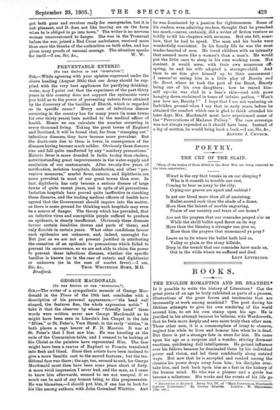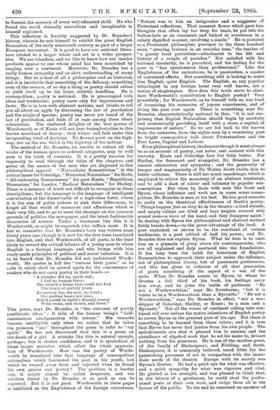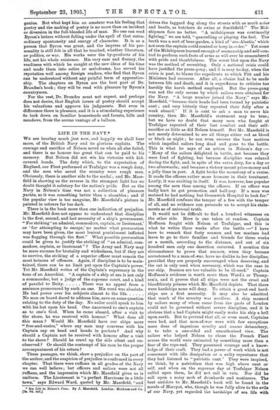THE ENGLISH ROMANTICS AND DR. BRANDES.* Is it possible to
write the history of Literature ? Can the great poets of an age be truly exhibited as parts of a process, illustrations of the great forces and tendencies that are incessantly at work among mankind ? The poet during his lifetime attempts to give his own rendering of the world around him, to set his own stamp upon his age. He is justified in his attempt because he believes, with Wordsworth, that he feels more deeply and sees more truly than other men. These other men, it is a commonplace of irony to observer neglect him while he lives and honour him when he is dead. But there is yet a stranger fate in store for him. He came upon his age as a surprise and a wonder, stirring dormant emotions, quickening dull intelligences. He gained influence over his fellows because he dominated them by his individual power and vision, and led them confidently along untried ways. But now that be is accepted and ranked among the classics his power drops away from him ; his disciples over- take him, and look back upon him as a fact in the history of the human mind. He who was a pioneer and a guide has become a milestone. His works and the events of his life go Naturalism in England. Being VoL IV. of "Main Currents in Nineteenth Century Literature." By George Braude*. London : W. Heinemann. [12s. net.] to furnish the memory of every well-educated child. He who found the world eternally marvellous and inexplicable is
himself explained.
This reflection is forcibly suggested by Dr. Brandes's history, wherein he sets himself to exhibit the great English Romantics of the early nineteenth century as part of a larger European movement. It is good to have our national litera- ture related to a larger whole and set in a wider perspec- tive. We are islanders, and we like to know how our insular products appear to one whose mind has been nourished by ranging over a continent. Moreover, Dr. Brandes has a really human sympathy and an alert understanding of many things. But he is first of all a philosopher and an historian, and it is inevitable that something of the delicacy, something even of the essence, of so shy a thing as poetry should refuse to yield itself up to his large, athletic handling. He is cosmopolitan ; poetry is national. He is preoccupied with ideas and tendencies ; poetry cares only for impressions and facts. He is in love with abstract notions, and thinks to tell you all about an apple by discussing the law of gravitation and the origin of species ; poetry has never yet heard of the law of gravitation, and feels ill at ease among these bleak solemnities. The sheltered delights of the best poems of Wordsworth or of Keats will not bear transplantation to this barren moorland of theory ; they wither and fade under this invigorating wind of doctrine. No flowers grow on the high- way, nor on the sea, which is the highway of the nations.
The method of Dr. Brandes, his resolve to reduce all the works of the human spirit to ordered categories, may be well seen in his table of contents. It is a pretty exercise for ingenuity to read through the titles of the chapters and guess at the names of the men who are disguised in this philosophical apparel. " Naturalistic Romanticism" is the critical name for Coleridge, "Historical Naturalism " for Scott, " All-embracing Sensuousness " for poor Keats, " Republican Humanism" for Lando; "Radical Naturalism" for Shelley. There is a measure of truth not difficult to recognise in these descriptions ; but the language is the language of intelligent conversation at the dinner-table of a high-class hotel, where it is the aim of polite talkers to sink their differences, to forget all that world of memories and affections which is their very life, and to go to meet the stranger on the common grounds of politics, the newspaper, and the latest fashionable discoveries of science. Under a treatment like this it is Wordsworth, as might be expected, who suffers most. It is fair to remember that Dr. Brandes's book was written some thirty years ago, though it is now for the first time translated into English, and that Wordsworth, of all poets, is the least likely to reward the critical labours of a young man to whom English is a foreign language, and who brings with him ready-made principles of political and moral valuation. It is to be feared that Dr. Brandes did not understand Words- worth. He quotes in full the "curious little poem," as he calls it, which shall be quoted again for the convenience of
readers who do not carry poetry in their heads :— " A slumber did my spirit seal;
I had no human fears;
She seem'd a thing that could not feel The touch of earthly years.
No motion has she now, no force ; She neither hears nor sees ;
Roll'd round in earth's diurnal course With rocks, and stones, and trees."
This poem, says Dr. Brandes, is the outcome of purely pantheistic ideas " ; it tells of the human being's " half- unconscious amalgamation with nature." His remarks become intelligible only when we notice that he takes the pronoun " she " throughout the poem to refer to " my spirit." He has not discovered that this is a poem on the death of a girl. A mistake like this is natural enough, perhaps ; but it shakes confidence, and it is symbolical of those larger mistakes which affect the whole apprecia- tion of Wordsworth. How can the poetry of Words- worth be translated into that language of cosmopolitan rationalism which fascinated the poet in his youth, but which he turned away from and rejected when he found his own genius and poetry ? The problem is a knotty
one, it might almost be called desperate, and the solution found by Dr. Brandes is as good as can be " Nature was to him an invigorator and a suggester of Protestant reflections. That meanest flower which gave hiro thoughts that often lay too deep for tears, he put into his button-hole as an ornament, and looked at sometimes in a. calmly dignified manner, revolving a simile." He is pictured. as a Protestant philosopher, purveyor to the three hundred sects, "uttering truisms in an oracular tone," the teacher of "a purely local patriotism—attachment to the life and history of a couple of parishes." Not satisfied with his national insularity, he is parochial, and his feeling for the poor is " less spontaneous than professional." Like the Englishman of the caricatures, he is passionless, a master of calculated effects. But something still is lacking to make him English, quite English. The English, as any popular ethnologist in any foreign hotel very well knows, are a. nation of shopkeepers. How does this truth serve to eluci- date Wordsworth's contribution to English poetry P Very powerfully; for Wordsworth, as he himself tells us, was fond of treasuring his memories of joyous experiences, and of living the past over again. There is something, says Dr. Brandes, characteristically national in this ; "it is not sur- prising that English Naturalism should begin by carefully and economically providing itself with a store, a capital, of impressions of nature." So we are led back to the known from the unknown, from the sights seen by a wandering poet. to bright cosmopolitan talk about Protestantism and the Poor Laws, Capital and Labour.
Even philosophical history, inadequate though it must always be as an account of poetry, can never rest content with this travesty. Keats and Coleridge fare but little better. For Shelley, the democrat and evangelist, Dr. Brandes has a sincere admiration and sympathy ; and the generosity of temper and magnanimity of Sir Walter Scott excite him to• better criticism. There is still too much aneodotage, which is employed to relieve the monotony of an abstract treatment,. and to add a dash of colour and intimacy to popular mis- conceptions. But when he deals with men like Scott and Byron, whose influence and work are in some sense cosmo- politan, Dr. Brandes is seen at his best. He has good remarks. to make on the theatrical effectiveness of Scott's poetry- " Things happen just as they do in the theatre : a loud whistle, and empty valleys are filled and bare heights covered with armed men—a wave of the hand, and they disappear again." In dealing with Byron the philosophical and abstract method. fairly breaks down,—to the great advantage of the book. A poet explained, or shown to be the resultant of certain tendencies, is a poet robbed of half his power; and Dr. Brandes does not explain Byron. What he does is to raise him on a pinnacle of glory above his contemporaries, who are all explained and duly mortared into the foundations. It has long been the habit for historians of English Romanticism to approach their subject under the influence,. not of philosophical theory, but of passionate preferences, and this has given to criticism of all that generation of poets something of the aspect of a war of the sects. When Dr. Brandes comes to Byron, to whom he devotes a full third of his book, his feelings carry him away, and he joins the battle of partisans. " Be not a Wordsworthian," says Mr. Swinburne ; " but it is better to be a Wordsworthian than a Byronite." " Be not a. Wordsworthian," says Dr. Brandes in effect, " nor a wor- shipper of Coleridge, Shelley, or Keats ; be a man and a. Byronite." Not all the voices of continent calling unto con- tinent will ever induce the native inheritors of English poetry to crown Byron as the greatest poet of his age. But there is something to be learned from these voices; and it is true that Byron has never had justice from his own people. The melodramatic airs that it pleased him to assume, and the abundance of slipshod work that he set his name te, detraot nothing from his greatness. He is one of the careless great,. of the family of Shakespeare, and Fielding, and Scott. Shakespeare, it is commonly believed, cared little for the painstaking processes of art in comparison with the imme- diate needs of the theatre. Europe with its society was Byron's theatre. He had a quick eye for what was effective, and a quick sympathy for what was vigorous and vital. He gloried in his strength, and was pleased to think that, in the leisure of a gentleman, he could rival the profes- sional poets at their own work, and outgo them all in the favour of the public. To the end he remained an amateur of
genius. But what kept him an amateur was his feeling that poetry and the making of poetry is no more than an incident or diversion in the full-blooded life of man. No one can read Byron's letters without falling under the spell of that extra- ordinary spontaneity and energy of character. It is as a person that Byron was great, and the impress of his per- sonality is still felt in all that he touched, whether literature, or politics, or war. His works were the by-products of his life, not his whole existence. His very ease and fluency, the readiness with which he caught at the new ideas of his time and made them into satire or melodrama, has served his reputation well among foreign readers, who find that Byron can be understood without any painful term of apprentice- ship. The chapters on Byron are the best part of Dr. Brandes's book ; they will be read with pleasure by Byron's countrymen. For the rest, Dr. Brandes must not expect, and perhaps does not desire, that English lovers of poetry should accept his valuations and approve his judgments. But even in difference there is pleasure, and it is a stimulating experience to look down on familiar homesteads and forests, hills and meadows, from the serene vantage of a balloon.
LIFE IN THE NAVY.*












































 Previous page
Previous page